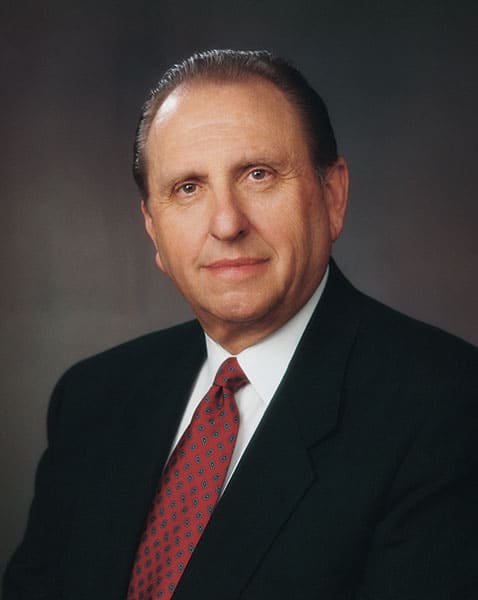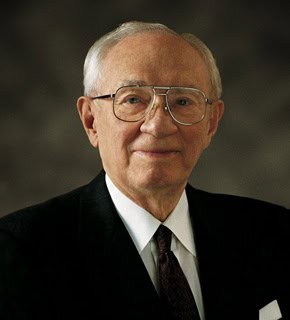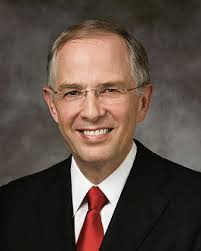Sacrifice
SEARCH BY TITLE
 Be of Good Cheer
Be of Good Cheer
It would be easy to become discouraged and cynical about the future—or even fearful of what might come—if we allowed ourselves to dwell only on that which is wrong in the world and in our lives. Today, however, I’d like us to turn our thoughts and our attitudes away from the troubles around us and to focus instead on our blessings as members of the Church. The Apostle Paul declared, “God hath not given us the spirit of fear; but of power, and of love, and of a sound mind. None of us makes it through this life without problems and challenges—and sometimes tragedies and misfortunes. After all, in large part we are here to learn and grow from such events in our lives. We know that there are times when we will suffer, when we will grieve, and when we will be saddened. However, we are told, “Adam fell that men might be; and men are, that they might have joy.” How might we have joy in our lives, despite all that we may face? Again from the scriptures: “Wherefore, be of good cheer, and do not fear, for I the Lord am with you, and will stand by you.” The history of the Church in this, the dispensation of the fulness of times, is replete with the experiences of those who have struggled and yet who have remained steadfast and of good cheer as they have made the gospel of Jesus Christ the center of their lives. This attitude is what will pull us through whatever comes our way. It will not remove our troubles from us but rather will enable us to face our challenges, to meet them head on, and to emerge victorious. Too numerous to mention are the examples of all the individuals who have faced difficult circumstances and yet who have persevered and prevailed because their faith in the gospel and in the Savior has given them the strength they have needed. This morning, however, I’d like to share with you three such examples.
 Four B’s for Boys
Four B’s for Boys
I should like to tell you of three eighteen-year-old boys. In 1856 more than a thousand of our people, some of them perhaps your forebears, found themselves in serious trouble while crossing the plains to this valley. Because of a series of unfortunate circumstances, they were late in getting started. They ran into snow and bitter cold in the highlands of Wyoming. Their situation was desperate, with deaths occurring every day. President Young learned of their condition as the October general conference was about to begin. He immediately called for teams, wagons, drivers, and supplies to leave to rescue the bereft Saints. When the first rescue team reached the Martin Company, there were too few wagons to carry the suffering people. The rescuers had to insist that the carts keep moving. When they reached the Sweetwater River on November 3, chunks of ice were floating in the freezing water. After all these people had been through, and in their weakened condition, that river seemed impossible to cross. It looked like stepping into death itself to move into the freezing stream. Men who once had been strong sat on the frozen ground and wept, as did the women and children. Many simply could not face that ordeal. And now I quote from the record: “Three eighteen-year-old boys belonging to the relief party came to the rescue, and to the astonishment of all who saw, carried nearly every member of the ill-fated handcart company across the snowbound stream. The strain was so terrible, and the exposure so great, that in later years all the boys died from the effects of it. When President Brigham Young heard of this heroic act, he wept like a child, and later declared publicly, ‘that act alone will ensure C. Allen Huntington, George W. Grant, and David P. Kimball an everlasting salvation in the Celestial Kingdom of God, worlds without end.’” Mark you, these boys were eighteen years of age at the time. And, because of the program then in effect, they likely were holders of the Aaronic Priesthood. Great was their heroism, sacred the sacrifice they made of health and eventually of life itself to save the lives of those they helped. They are part of the heritage that lies behind you of the Aaronic Priesthood. Be true, my young brethren, be true to that great inheritance.
 It’s True Isn’t It? Then What Else Matters
It’s True Isn’t It? Then What Else Matters
I take as my subject today something President Hinckley said in general conference in April of 1973.I had just returned home from my mission. So much seemed ahead of me. Would I be able to consistently make the right choices throughout my life? Then-Elder Gordon B. Hinckley spoke of meeting a young naval officer from Asia. The officer had not been a Christian, but during training in the United States, he had learned about the Church and was baptized. He was now preparing to return to his native land. President Hinckley asked the officer: “Your people are not Christians. What will happen when you return home a Christian, and, more particularly, a Mormon Christian?” The officer’s face clouded, and he replied: “My family will be disappointed. … As for my future and my career, all opportunity may be foreclosed against me.” President Hinckley asked, “Are you willing to pay so great a price for the gospel?” With his dark eyes moistened by tears, he answered with a question: “It’s true, isn’t it?” President Hinckley responded, “Yes, it is true.” To which the officer replied, “Then what else matters?” Through the years, I have reflected on these words: “It’s true, isn’t it? Then what else matters?” These questions have helped me put difficult issues in proper perspective. The cause in which we are laboring is true. We respect the beliefs of our friends and neighbors. We are all sons and daughters of God. We can learn much from other men and women of faith and goodness, as President Faust taught us so well. Yet we know that Jesus is the Christ. He is resurrected. In our day, through the Prophet Joseph Smith, the priesthood of God has been restored. We have the gift of the Holy Ghost. The Book of Mormon is what we claim it to be. The promises of the temple are certain. The Lord Himself has declared the unique and singular mission of The Church of Jesus Christ of Latter-day Saints to be “a light to the world” and “a messenger … to prepare the way before [Him]” even as “the gospel roll[s] forth unto the ends of the earth.” It’s true, isn’t it? Then what else matters?
 The True Strength of the Church
The True Strength of the Church
He then went on to say: “The fastest growing church [of] over a million members in this country is the Mormon Church, the Latter-day Saints, with headquarters in Salt Lake City, which is growing at five percent a year, [and] that’s a very rapid increase.” This is a most striking commentary, and one that should concern every thoughtful man and woman. One thing that it says is that a religion which requires devotion, which asks for sacrifice, which demands discipline, also enjoys the loyalty of its membership and the interest and respect of others. It was ever thus. The Savior did not equivocate when he said to Nicodemus: “Except a man be born of the water and of the Spirit, he cannot enter into the kingdom of God.” There were no exceptions. There was no permissiveness in complying with the rule. It was so in other matters of which he spoke. Paul never hedged nor quibbled when setting forth the requirements of the gospel of Jesus Christ. It is so today. The Lord himself declared that “strait is the gate and narrow is the way.” Any system dealing with the eternal consequences of human behavior must set guidelines and adhere to them, and no system can long command the loyalties of men that does not expect of them certain measures of discipline, and particularly of self-discipline. The cost in comfort may be great. The sacrifice may be real. But this very demanding reality is the substance of which come character and strength and nobility.
